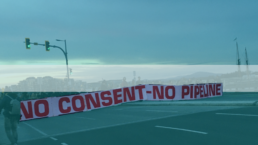Despite a Supreme Court ruling, Coastal GasLink is on track to be built through unceded land.
By Mark Armao, Grist
When Chief Dsta’hyl arrived on a Saturday morning in October, the big construction vehicles rumbled back and forth over the cold mud. He watched an excavator dig into the soil, its yellow, hydraulic arm moving against the green backdrop of forests that he has called home all his life.
The area that was being prepared for construction lies within the territory of the Wet’suwet’en, a First Nation in what is currently called British Columbia, Canada. As a supporting chief from the Likhts’amisyu clan, Dsta’hyl had been tasked with enforcing Wet’suwet’en law in the area.

The scene he was witnessing — construction crews preparing to build a pipeline through Wet’suwet’en territory, without their consent — represented a blatant violation of those laws. And Dsta’hyl had seen enough. After warning the on-site construction managers that they were trespassing, he arrived the next day and approached a pair of orange-vested security subcontractors employed by TC Energy, the company building the fracked gas pipeline known as Coastal GasLink, or CGL. He notified them that he would be seizing one of their excavators and then stepped onto the hulking vehicle and disabled it by disconnecting its battery and other components. Though he planned to leave the vehicle in place, Dsta’hyl said he wanted to make a statement to the company, which the traditional leaders decided to evict from their territory last year.
Recent Posts
‘Unconstitutional. Unethical. Authoritarian.’ ICE Bars Millions Of Immigrants From Bond Hearings
July 18, 2025
Take Action Now One watchdog said the new policy “seems like a blatant attempt to stop them from exercising their right to due process.”……
Americans Are Not Nearly Alarmed Enough About Climate Change
July 18, 2025
Take Action Now Americans still don’t comprehend how imminent, dangerous, and far-reaching the threat is—and journalists are partly to blame.By…
The IRS Is Building A Vast System To Share Millions Of Taxpayers’ Data With ICE
July 17, 2025
Take Action Now ProPublica has obtained the blueprint for the Trump administration’s unprecedented plan to turn over IRS records to Homeland Security…
Israel’s Sudden Assault On Syria Is Unchecked Aggression
July 17, 2025
Take Action Now Jerusalem is bombing Damascus and threatening al-Sharaa’s rule, while Washington was hoping to help the nascent government on…




